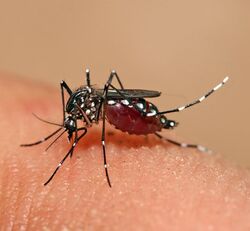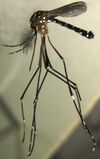Biology:Aedes
| Aedes | |
|---|---|

| |
| Aedes aegypti | |
| Scientific classification | |
| Kingdom: | Animalia |
| Phylum: | Arthropoda |
| Class: | Insecta |
| Order: | Diptera |
| Family: | Culicidae |
| Tribe: | Aedini |
| Genus: | Aedes Meigen, 1818 |
| Type species | |
| Aedes cinereus Meigen, 1818
| |
| Species | |
Aedes (also known as the tiger mosquito[1]) is a genus of mosquitoes originally found in tropical and subtropical zones, but now found on all continents except Antarctica. Some species have been spread by human activity: Aedes albopictus, a particularly invasive species, was spread to the Americas, including the United States , in the 1980s, by the used-tire trade.[2]
First described and named by German entomologist Johann Wilhelm Meigen in 1818, the generic name comes from the Ancient Greek ἀηδής, aēdēs, meaning 'unpleasant' or 'odious'. The type species for Aedes is Aedes cinereus.[3]
Systematics and phylogeny

The genus was named by Johann Wilhelm Meigen in 1818. The generic name comes from the Ancient Greek ἀηδής, aēdēs, meaning 'unpleasant'[5] or 'odious'.
As historically defined, the genus contains over 700 species (see the list of Aedes species). The genus has been divided into several subgenera (Aedes, Diceromyia, Finlaya, Stegomyia, etc.), most of which have been recently treated by some authorities as full genera.[6] The classification was revised in 2009.[7]
Characteristics
Aedes mosquitoes are visually distinctive because they have noticeable black and white markings on their bodies and legs. Unlike most other mosquitoes, they are active and bite only during the daytime. The peak biting periods are early in the morning and in the evening before dusk.[8][9]
Direct children of this genus
The genus contains 28 species that are not placed in a further subgenus:[10]
- Aedes daliensis (Taylor, 1916)
- Aedes mallochi Taylor, 1944
Children with uncertain position
- Aedes alticola Bonne Wepster, 1948
- Aedes auronitens Edwards, 1922
- Aedes australiensis (Theobald, 1910)
- Aedes biocellatus (Taylor, 1914)
- Aedes britteni Marks and Hodgkin, 1958
- Aedes candidoscutellum Marks, 1947
- Aedes crossi Lien, 1967
- Aedes eatoni (Edwards, 1916)
- Aedes gracilelineatus Bonne-Wepster, 1937
- Aedes keefei King and Hoogstraal, 1946
- Aedes peipingensis Feng, 1938
- Aedes koreicoides Sasa, Kano and Hayashi, 1950
- Aedes lauriei King and Hoogstraal, 1946
- Aedes monocellatus Marks, 1948
- Aedes oreophilus (Edwards, 1916)
- Aedes plagosus Marks, 1959
- Aedes quasirubithorax (Theobald, 1910)
- Aedes roai Belkin, 1962
- Aedes rubiginosus Belkin, 1962
- Aedes sintoni (Barraud, 1924)
- Aedes stanleyi Peters, 1963
- Aedes subauridorsum Marks, 1948
- Aedes toxopeusi Bonne-Wepster, 1948
- Aedes tsiliensis King and Hoogstraal, 1946
- Aedes versicolor (Barraud, 1924)
- Aedes wasselli Marks, 1947
- Aedes annuliventris Blanchard, 1852
As disease vectors
Members of the genus Aedes are known vectors for numerous viral infections, including dengue fever, yellow fever, the Zika virus,[11] and chikungunya, which are transmitted by species in the subgenus Stegomyia, and by A. aegypti and A. albopictus.[12] Infections with these viruses are typically accompanied by a fever, and in some cases, encephalitis, which can lead to death. A vaccine to provide protection from yellow fever exists, and measures to prevent mosquito bites include insecticides such as DDT, mosquito traps, insect repellents, mosquito nets, and pest control using genetically modified insects.[13] In Polynesia, the species Aedes polynesiensis is responsible for the transmission of human lymphatic filariasis.
Aedes can be detected and monitored by ovitraps.
Sequencing
The genome of the yellow fever mosquito (Aedes aegypti) was sequenced by the Broad Institute and the Institute for Genomic Research. The initial assembly was released in August 2005; a draft sequence of the genome and preliminary analysis was published in June 2007.[14] The annotated genome is available at VectorBase.[15] An updated and improved version of the Aedes aegypti genome was released in 2018.[16]
References
- ↑ Wilkerson, Richard C.; Linton, Yvonne-Marie; Strickman, Daniel (2021). "Genera and Medically Important Species Pages". Mosquitoes of the World. 1. Baltimore, Maryland: Johns Hopkins University Press. pp. 222. ISBN 978-1-4214-3814-6.
- ↑ Hawley, William A.; Reiter, Paul; Copeland, Robert S.; Pumpuni, Charles B.; Craig, George B. (1987-05-29). "Aedes albopictus in North America: Probable Introduction in Used Tires from Northern Asia". Science 236 (4805): 1114–1116. doi:10.1126/science.3576225. ISSN 0036-8075. PMID 3576225. Bibcode: 1987Sci...236.1114H. https://www.science.org/doi/epdf/10.1126/science.3576225.
- ↑ "Aedes". Walter Reed Biosystematics Unit. http://www.wrbu.org/generapages/aedes.htm..
- ↑ "Stegomyia mosquitoes in Mayotte, taxonomic study and description of Stegomyia pia n. sp". Parasite 20: 31. 2013. doi:10.1051/parasite/2013030. PMID 24025625.
- ↑ Powell, Jeffrey R.; Tabachnick, Walter J. (2013). "History of domestication and spread of Aedes aegypti - A Review". Memórias do Instituto Oswaldo Cruz 108 (Suppl 1): 11–17. doi:10.1590/0074-0276130395. PMID 24473798.
- ↑ "Phylogeny and classification of Aedini (Diptera: Culicidae), based on morphological characters of all life stages". Zoological Journal of the Linnean Society 142 (3): 289–368. 2004. doi:10.1111/j.1096-3642.2004.00144.x.
- ↑ "Phylogeny and classification of tribe Aedini (Diptera: Culicidae)". Zoological Journal of the Linnean Society 157 (4): 700–794. 2009. doi:10.1111/j.1096-3642.2009.00570.x. http://www.nhm.ac.uk/resources-rx/files/reinert-et-al-2009-58741.pdf.
- ↑ "Dengue and severe dengue". World Health Organization. 24 October 2019. https://www.who.int/news-room/q-a-detail/dengue-and-severe-dengue.
- ↑ "Dengue and severe dengue". World Health Organization. 19 May 2021. https://www.who.int/news-room/fact-sheets/detail/dengue-and-severe-dengue.
- ↑ "ITIS - Report: Aedes". https://www.itis.gov/servlet/SingleRpt/SingleRpt?search_topic=TSN&search_value=126234#null.
- ↑ "CDC Transmission of Zika virus". https://www.cdc.gov/zika/transmission/index.html.
- ↑ "PAHO Statement on Zika Virus Transmission and Prevention". Pan American Health Organization. 2 February 2016. http://www.paho.org/hq/index.php?option%3Dcom_content%26view%3Darticle%26id%3D11605%26Itemid%3D0%26lang%3Den.
- ↑ Fitzsimons, Tom (11 March 2022). "EPA OKs plan to release 2.4 million more genetically modified mosquitoes" (in en). NBC News. https://www.nbcnews.com/news/us-news/epa-oks-plan-release-24-million-genetically-modified-mosquitoes-rcna19738.
- ↑ "Genome sequence of Aedes aegypti, a major arbovirus vector". Science 316 (5832): 1718–23. June 2007. doi:10.1126/science.1138878. PMID 17510324. Bibcode: 2007Sci...316.1718N.
- ↑ "Aedes aegypti". VectorBase. https://www.vectorbase.org/organisms/aedes-aegypti.
- ↑ "Improved reference genome of Aedes aegypti informs arbovirus vector control". Nature 563 (7732): 501–507. November 2018. doi:10.1038/s41586-018-0692-z. PMID 30429615. Bibcode: 2018Natur.563..501M.
External links
- Singapore Government dengue site that describes the mosquito
- "Aedes". NCBI Taxonomy Browser. https://www.ncbi.nlm.nih.gov/Taxonomy/Browser/wwwtax.cgi?mode=Info&id=7158.
Wikidata ☰ Q310911 entry
 |
